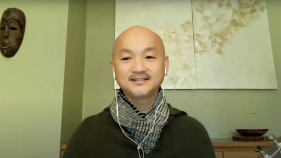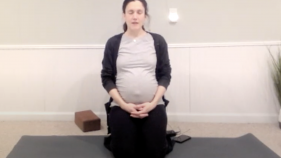Resource List
Videos
Books
Poetry
“You must speak not only of great devastation
but of women kissing in the yellow grass!”
I heard this not from a great philosopher
but from my brother Tony
who could do four haircuts in thirteen minutes,
his eyes closed, reciting our National Anthem to the mirror.
“You must drink cucumber vodka and naked sing all night
Unite women and boys of the Earth!”
He played the accordion out of tune in a country
where the only musical instrument is the door.
“Speak not only of great devastation”
so said my brother, who could not write or read
but spent his days covered in other people’s hair.
I’ve been thinking about the way, when you walk
down a crowded aisle, people pull in their legs
to let you by. Or how strangers still say “bless you”
when someone sneezes, a leftover
from the Bubonic plague. “Don’t die,” we are saying.
And sometimes, when you spill lemons
from your grocery bag, someone else will help you
pick them up. Mostly, we don’t want to harm each other.
We want to be handed our cup of coffee hot,
and to say thank you to the person handing it. To smile
at them and for them to smile back. For the waitress
to call us honey when she sets down the bowl of clam chowder,
and for the driver in the red pick-up truck to let us pass.
We have so little of each other, now. So far
from tribe and fire. Only these brief moments of exchange.
What if they are the true dwelling of the holy, these
fleeting temples we make together when we say, “Here,
have my seat,” “Go ahead—you first,” “I like your hat.”
For those interested in reading more, see Danusha Laméris, Small Kindness, in Healing the Divide: Poems of Kindness and Connection 56 (James Crews ed., 2019).
Gracias to the word
that is thankful.
Thanks to gracias
for the extent
to which this word
melts snow or iron.
The world appeared threatening
until
soft
went
gracias
from lip to lip
as a clear-headed
pen,
or sweet like a sugar petal,
or whispering,
barely being voiced,
and a being became man again
and not a window,
some clarity
entered the forest,
able to sing amid the leaves.
Gracias, you’re a pill
against
scorn’s biting oxides,
light against the altar of harshness.
Perhaps
you were
also carpet
between the most distant men.
Passengers are disseminated
in nature
and then
in the jungle
of unknown men,
merci,
while the frantic train
switches countries,
erases borders,
spasivo,
near the sharp-cusped
volcanoes, cold and fire,
thanks, yes, gracias, and then
the earth becomes a table,
a word swept it clean,
plates and cups shine,
forks jingle
and plains resemble tablecloths.
Thanks, gracias,
may you travel and return,
rise up
and come down.
It’s understood that you,
word of gracias,
don’t permeate all things,
but where
your small petal
appears,
proud daggers hide away
and a penny’s worth of smiles emerges.
For those interested in reading more, see Pablo Neruda, Ode to Thanks, in Odes to Common Things, Bilingual Edition 301-02 (1994).
Every day
I see or I hear
something
that more or less
kills me
with delight,
that leaves me
like a needle
in the haystack
of light.
It is what I was born for—
to look, to listen,
to lose myself
inside this soft world—
to instruct myself
over and over
in joy,
and acclamation.
Nor am I talking
about the exceptional,
the fearful, the dreadful,
the very extravagant—
but of the ordinary,
the common, the very drab,
the daily presentations.
Oh, good scholar,
I say to myself,
how can you help
but grow wise
with such teachings
as these—
the untrimmable light
of the world,
the ocean’s shine,
the prayers that are made
out of grass?
For those interested in reading more, see Mary Oliver, Mindful, in Why I Wake Early: New Poems 58-59 (2004).
When death comes
like the hungry bear in autumn;
when death comes and takes all the bright coins from his purse
to buy me, and snaps the purse shut;
when death comes
like the measle-pox;
when death comes
like an iceberg between the shoulder blades,
I want to step through the door full of curiosity, wondering:
what is it going to be like, that cottage of darkness?
And therefore I look upon everything
as a brotherhood and a sisterhood,
and I look upon time as no more than an idea,
and I consider eternity as another possibility,
and I think of each life as a flower, as common
as a field daisy, and as singular,
and each name a comfortable music in the mouth,
tending, as all music does, toward silence,
and each body a lion of courage, and something
precious to the earth.
When it’s over, I want to say: all my life
I was a bride married to amazement.
I was the bridegroom, taking the world into my arms.
When it’s over, I don’t want to wonder
if I have made of my life something particular, and real.
I don’t want to find myself sighing and frightened,
or full of argument.
I don’t want to end up simply having visited this world.
For those interested in reading more, see Mary Oliver, When Death Comes, in Devotions: The Selected Poems of Mary Oliver 285-86 (2017).
Above the mountains
the geese turn into
the light again
painting their
black silhouettes
on an open sky.
Sometimes everything
has to be
inscribed across
the heavens
so you can find
the one line
already written
inside you.
Sometimes it takes
a great sky
to find that
small, bright
and indescribable
wedge of freedom
in your own heart.
Sometimes with
the bones of the black
sticks left when the fire
has gone out
someone has written
something new
in the ashes
of your life.
You are not leaving
you are arriving.
For those interested in reading more, see David Whyte, The Journey, in The House of Belonging 37-38 (1997).
Watching the moon
at dawn,
solitary, mid-sky,
I knew myself completely:
no part left out.
For those interested in reading more, see Izumi Shikibu, Watching the moon, in The Enlightened Heart: An Anthology of Sacred Poetry 40 (Stephen Mitchell ed., 1993).
[…]
My wish for you
Is that you continue
Continue
To be who and how you are
To astonish a mean world
With your acts of kindness
Continue
To allow humor to lighten the burden
of your tender heart
Continue
In a society dark with cruelty
To let the people hear the grandeur
Of God in the peals of your laughter
Continue
To let your eloquence
Elevate the people to heights
They had only imagined
Continue
To remind the people that
Each is as good as the other
And that no one is beneath
Nor above you
Continue
To remember your own young years
And look with favor upon the lost
And the least and the lonely
Continue
To put the mantel of your protection
Around the bodies of
The young and defenseless
Continue
To take the hand of the despised
And diseased and walk proudly with them
In the high street
Some might see you and
Be encouraged to do likewise
Continue
To plant a public kiss of concern
On the cheek of the sick
And the aged and infirm
And count that as a
Natural action to be expected
Continue
To let gratitude be the pillow
Upon which you kneel to
Say your nightly prayer
And let faith be the bridge
You build to overcome evil
And welcome good
Continue
To ignore no vision
Which comes to enlarge your range
And increase your spirit
Continue
To dare to love deeply
And risk everything
For the good thing
Continue
To float
Happily in the sea of infinite substance
Which set aside riches for you
Before you had a name
Continue
And by doing so
You and your work
Will be able to continue
Eternally
For those interested in reading more, see Maya Angelou, Continue, in The Complete Poetry 272-75 (2015).
The pith instruction is, Stay…stay…just stay. Learning to stay with ourselves in meditation is like training a dog. If we train a dog by beating it, we’ll end up with an obedient but very inflexible and rather terrified dog. The dog may obey when we say “Stay!” “Come!” “Roll over!” and “Sit up!” but he will also be neurotic and confused. By contrast, training with kindness results in someone who is flexible and confident, who doesn’t become upset when situations are unpredictable and insecure.
So whenever we wander off, we gently encourage ourselves to “stay” and settle down. Are we experiencing restlessness? Stay! Discursive mind? Stay! Are fear and loathing out of control? Stay! Aching knees and throbbing back? Stay! What’s for lunch? Stay! What am I doing here? Stay! I can’t stand this another minute! Stay! That is how to cultivate steadfastness.
For those interested in reading more, see Pema Chodron, The Places That Scare You 26-27 (2002).
What a powerful lesson is the beginning of spring. All around us, everything small and buried surrenders to the process that none of the buried parts can see. And this innate surrender allows everything edible and fragrant to break ground into a life of light that we call spring.
In nature, we are all quietly given countless models of how to give ourselves over to what appears dark and hopeless, but which ultimately is an awakening that is beyond all imagining. This moving through the dark into blossom is the threshold to God.
As a seed buried in the earth cannot imagine itself as an orchid or hyacinth, neither can a heart packed with hurt imagine itself loved or at peace. The courage of the seed is that once cracking, it cracks all the way.
For those interested in reading more, see Mark Nepo, The Book of Awakening 113-14 (2020).
Johnny, the kitchen sink has been clogged for days, some utensil probably fell down there.
And the Drano won't work but smells dangerous, and the crusty dishes have piled up
waiting for the plumber I still haven’t called. This is the everyday we spoke of.
It’s winter again: the sky’s a deep, headstrong blue, and the sunlight pours through
the open living-room windows because the heat’s on too high in here and I can’t turn it off.
For weeks now, driving, or dropping a bag of groceries in the street, the bag breaking,
I've been thinking: This is what the living do. And yesterday, hurrying along those
wobbly bricks in the Cambridge sidewalk, spilling my coffee down my wrist and sleeve,
I thought it again, and again later, when buying a hairbrush: This is it.
Parking. Slamming the car door shut in the cold. What you called that yearning.
What you finally gave up. We want the spring to come and the winter to pass. We want
whoever to call or not call, a letter, a kiss—we want more and more and then more of it.
But there are moments, walking, when I catch a glimpse of myself in the window glass,
say, the window of the corner video store, and I'm gripped by a cherishing so deep
for my own blowing hair, chapped face, and unbuttoned coat that I’m speechless:
I am living. I remember you.
For those interested in reading more, see Marie Howe, What the Living Do, in What the Living Do: Poems 89-90 (1999).
This being human is a guest house.
Every morning a new arrival.
A joy, a depression, a meanness,
some momentary awareness comes
as an unexpected visitor.
Welcome and entertain them all!
Even if they’re a crowd of sorrows,
who violently sweep your house
empty of its furniture,
still, treat each guest honorably.
He may be clearing you out
for some new delight.
The dark thought, the shame, the malice,
meet them at the door laughing,
and invite them in.
Be grateful for whoever comes,
because each has been sent
as a guide from beyond.
For those interested in reading more, see Rumi, The Guest House, in Rumi: Selected Poems 109 (Coleman Banks trans., 2004).
This is how a human being can change:
There’s a worm addicted to eating
grape leaves.
Suddenly, he wakes up,
call it grace, whatever, something
wakes him, and he’s no longer
a worm.
He is the entire vineyard,
and the orchard too, the fruit, the trunks,
a growing wisdom and joy
that doesn’t need
to devour.
For those interested in reading more, see Rumi, The Worm’s Waking, in Rumi: Selected Poems 265 (Coleman Banks trans., 2004).
The neighbors’ dog will not stop barking.
He is barking the same high, rhythmic bark
that he barks every time they leave the house.
They must switch him on on their way out.
The neighbors’ dog will not stop barking.
I close all the windows in the house
and put on a Beethoven symphony full blast
but I can still hear him muffled under the music,
barking, barking, barking,
and now I can see him sitting in the orchestra,
his head raised confidently as if Beethoven
had included a part for barking dog.
When the record finally ends he is still barking,
sitting there in the oboe section barking,
his eyes fixed on the conductor who is
entreating him with his baton
while the other musicians listen in respectful
silence to the famous barking dog solo,
that endless coda that first established
Beethoven as an innovative genius.
For those interested in reading more, see Billy Collins, Another Reason Why I Don't Keep a Gun in the House, in Sailing Alone Around the Room: New and Selected Poems 3 (2002).
No one ever tells us to stop running away from fear. We are rarely told to move closer, to just be there, to become familiar with fear … the advice we usually get is to sweeten it up, smooth it over, take a pill, or distract ourselves, but by all means make it go away. … The most heartbreaking thing of all is how we cheat ourselves of the present moment.
For those interested in reading more, see Pema Chodron, When Things Fall Apart 5-6 (2000).
We have no reason to mistrust our world, for it is not against us. Has it terrors, they are our terrors: has it abysses, those abysses belong to us: are dangers at hand, we must try to love them. And if only we arrange our life according to that principle which counsels us that we must always hold to the difficult, then that which now still seems to us the most alien will become what we most trust and find most faithful. How should we be able to forget those ancient myths that are at the beginning of all peoples, the myths about dragons that at the last moment turn into princesses; perhaps all the dragons of our lives are princesses who are only waiting to see us once beautiful and brave. Perhaps everything terrible is in its deepest being something helpless that wants help from us.
So you must not be frightened … if a sadness rises up before you larger than any you have ever seen; if a restiveness, like light and cloud-shadows, passes over your hands and over all you do. You must think that something is happening with you, that life has not forgotten you, that it holds you in its hand; it will not let you fall. Why do you want to shut out of your life any agitation, any pain, any melancholy, since you really do not know what these states are working upon you?
For those interested in reading more, see Rainer Maria Rilke, Letters to a Young Poet 52 (M. D. Herter Norton trans., 1993).
You develop an instant global consciousness, a people orientation, an intense dissatisfaction with the state of the world, and a compulsion to do something about it.
For those interested in reading more, see People Staff, Edgar Mitchell’s Strange Voyage, People (Apr. 8, 1974, 12:00 PM), https://people.com/archive/edgar-mitchells-strange-voyage-vol-1-no-6/.
Now through the white orchard my little dog
romps, breaking the new snow
with wild feet.
Running here running there, excited,
hardly able to stop, he leaps, he spins
until the white snow is written upon
in large, exuberant letters,
a long sentence, expressing
the pleasures of the body in this world.
Oh, I could not have said it better
myself.
For those interested in reading more, see Mary Oliver, The Storm (Bear), in Dog Songs 9 (2015).
I go among trees and sit still.
All my stirring becomes quiet around me
like circles on water.
My tasks lie in their places where I left them
asleep like cattle.
Then what is afraid of me comes
and lives a while in my sight.
What it fears in me leaves me
and the fear of me leaves it.
It sings and I hear its song.
Than what I am afraid of comes.
I live for a while in its sight.
What I fear in it leaves it
and the fear of it leaves me.
It sings and I hear its song.



